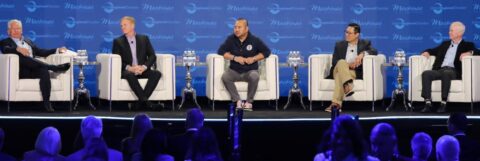- Actual industry growth for EVs is much lower than previously anticipated.
- Uncertainty from tariffs caused major shockwaves to the automotive industry that are inhibiting them from planning long-term investments.
- Global speed of mobility and innovation puts great pressure on the domestic automotive industry.

Top Takeaways
Panelists and Moderator
Cost and Competitiveness of EVs
A significant portion of the panel discussion centered on the cost of EVs and the struggle to reach an “inflection point” where they become broadly competitive with gasoline-powered cars in the U.S.
In China, EVs are widely attainable, with nearly half of their auto market share now comprised of EVs. At the same time, the U.S. faces higher production costs and a much smaller production scale, contributing to less-than-predicted market growth. Lee shared that previous years’ earlier forecasts of 49-50% annual EV growth “were clearly not realistic … If you look quarter to quarter from last year to this year, the market increased by 11%.”
However, the market is still growing at a more modest pace. The panelists emphasized reducing battery costs and opportunities to reduce the costs of domestically made EVs. In stark contrast to the much cheaper, feature-rich Chinese EVs, Le was not convinced that cost-cutting could be achieved without the amenities that consumers desire in vehicles.
“I don’t see Americans wanting to de-content vehicles to bring prices down, especially when you go [elsewhere like] Mexico and drive a BYD and see all these features,” Le said.
Impact of Tariffs
Later on in the panel, the speakers extensively discussed the detrimental effects of tariffs on the automotive industry, particularly concerning EVs. Many essential components must be imported, incurring significant tariffs. D’Eramo provided insight into the difficulty that the industry is facing.
“Right now, the OEMs are directionless in general. I can’t say, across the board, but [in general] they don’t know what to build,” D’Eramo said. “So, what we thought would be a tailwind finally has become another significant headwind.”
Another example that D’Eramo shared was that some auto manufacturers are paying billions of dollars in tariffs in just a few months, a cost that ultimately gets passed on to consumers, making already unaffordable cars even more expensive than employment, which is another blow to the automakers.
“We’ve seen layoffs. Now, whether that’s permanent, we’ll have to see,” McElroy said. “I asked, ‘Who is going to work in these factories?’ The number one complaint in these factories I visited is that you cannot get [anyone] to work in the plants. Talk to the younger people; there’s no interest in going to work in a factory.”
The uncertainty caused by fluctuating tariff policies and a dwindling number of skilled tradespeople makes it nearly impossible for businesses to make stable decisions and long-term investments.
Is Innovation A Priority?
While Michigan possesses strong R1 universities and existing innovation infrastructure, the panel questioned whether the state’s automotive culture is too risk-averse to foster the aggressive innovation needed to compete globally.
“Risk-averse [has been] in our culture for 100 years,” Le said. ” … so there’s been no need to be like Silicon Valley, or like Austin, where they nurture it.”
Lee agreed with this, adding,” … we have focused our trends in areas that are comfortable for us — which is making larger vehicles primarily sold in the U.S., and we’re not thinking of selling abroad. We take some risks and really work on our products so that they’re compelling [in a] much broader way.”
The panel concluded that to remain competitive, the U.S. automotive industry, particularly in Michigan, needs a clear, unified strategy that addresses tariffs, embraces technological advancement and a skilled workforce, and fosters a culture of innovation that can compete globally.
The road ahead may be challenging, but with thoughtful policy decisions and a commitment to innovation, Michigan can continue to be a leader in the automotive world in this new era.

Learn more about automotive & mobility in the region.
Our team can provide additional information regarding facilities, educational programs, and more.
Contact Us




